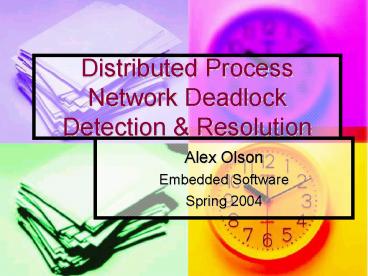Distributed Process Network Deadlock Detection - PowerPoint PPT Presentation
1 / 10
Title:
Distributed Process Network Deadlock Detection
Description:
SMP is overkill for PN coarse-grain parallelism (don't need shared memory) ... Tame the channel by counting and acknowledging tokens (on top of TCP) 7. Future Plans ... – PowerPoint PPT presentation
Number of Views:40
Avg rating:3.0/5.0
Title: Distributed Process Network Deadlock Detection
1
Distributed Process Network Deadlock Detection
Resolution
- Alex Olson
- Embedded Software
- Spring 2004
2
1. What is Process Networks?
- Process Network (PN) Kahn74
- Concurrent processes communicate only over
one-way channels (FIFO queues) - Reads block until enough data is available
- Determinate model of computation
- Queues are unbounded in size
- Program deadlocks only at termination
PN models functional parallelism
3
2. Why make PNs Distributed?
- Why make PNs distributed?
- Multiprocessor (SMP) desktops are expensive, have
limited number of processors ( 16 ) - SMP is overkill for PN coarse-grain parallelism
(dont need shared memory) - PNs are inherently parallelizable
- Perhaps one computer is specialized for
computation, another specialized for 3D
visualization, etc
4
3. Implementation of Distributed Process
Networks (DPN)
- Is it Easy?
- Deadlock Detection(Channel is now distributed)
- Load Balancing(Need to consider what subset of
all processes to put on each sever) - Dynamic Process Migration(Addition/Deletion of
Servers) - Objectives
- Create a high-performance DPN framework
compatible with the above - Implement Deadlock Detection
5
3. Extensions of Kahns PN
- Parks 95
- Sets capacity of each arc
- Writes to full queues (artificially) block
- On global deadlock, resize smallest queue
- Prefers incomplete bounded over complete
unbounded execution - Is determinacy of model compromised?
- Geilen Basten 03
- Prefers complete unbounded over incomplete
unbounded - Solves local deadlock detection/resolution
6
4. PN DPN Implementations
- All PN Implementations
- Map processes onto threads
- Rely on shared memory for deadlock detection
- All DPN Implementations
- Map processes onto threads, multiple servers
over a network - Only a few implementations exist
- None do deadlock detection!
7
5. DPN Deadlock Detection
- Network channel more complex than shared-memory
queue - Network latency
- Causes different views of channel
- Indeterminate capacity
- How much data is in transit?
- Send / Receive Buffers
- Even TCP doesnt completely guarantee delivery!
8
6. Conclusion
- Distributing PNs has cost performance benefits
- New problems arise in DPNs that didnt exist in
regular PNs. - No known DPN framework currently detects
deadlocks. - Implementation Plan
- Create simple, high-performance framework using
Java or C - Use a distributed global snapshot algorithm for
deadlock detection - Tame the channel by counting and acknowledging
tokens (on top of TCP)
9
7. Future Plans
- Evaluate deadlock detection overhead
- Examine queue sizes vs performance
- Compare DPN vs. PN performance
- Implement Dynamic Load Balancing
- Any questions?
10
8. References
Kahn 74 G. Kahn. "The Semantics of a Simple
Language for Parallel Programming." In J.L.
Rosenfeld, editor, Information Processing 74,
Proceedings, pages 471475, Stockholm, Sweden,
August 1974. North-Holland, Amsterdam, The
Netherlands, 1974. Parks 95 T.M. Parks.
"Bounded Scheduling of Process Networks." PhD
thesis, University of California, EECS Dept.,
Berkeley, CA, December 1995. Technical Memorandum
UCB/ERL M95/105. Geilen 03 M.C.W. Geilen and
T. Basten. "Requirements on the Execution of Kahn
Process Networks." Programming Languages and
Systems, ESOP 2003, Warsaw, Poland, April 7-11,
2003, Proceedings. Lecture Notes in Computer
Science. Berlin, Germany, 2003































